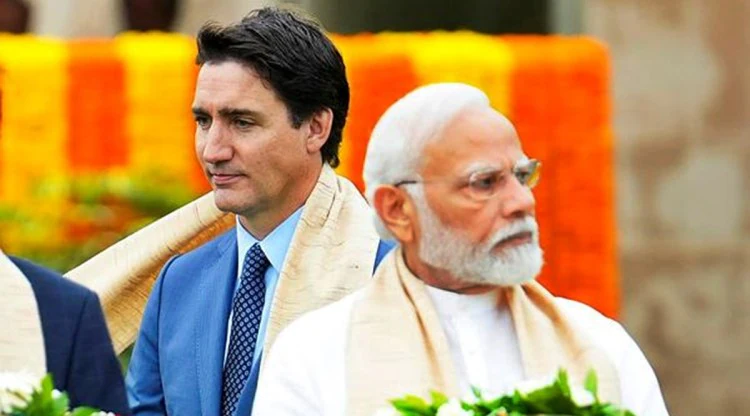The already strained ties between India and Canada escalated to a full blown diplomatic row 14 October, as both countries expelled their top envoys after Ottawa sought to link the Indian High Commissioner to an investigation into the assassination of Sikh extremist Hardeep Singh Nijjar.
Rejecting the “preposterous imputations” of the accusation, New Delhi said that the whole scheme was part of Canadian Prime Minister Justin Trudeau’s “political agenda” centered around “vote bank politics.”
On the same day, Canadian law enforcement officials at a Press conference claimed that the Indian government and its agents were running a broad criminal network in Canada, with a goal of intimidating and harassing Sikh separatists. The officials went on to allege that a criminal gang led by notorious gangster Lawrence Bishnoi has been involved in extortion, intimidation, coercion, and targeted killings of Canadian citizens, all at the behest of the Indian government.
In India, Lawrence Bishnoi is again in the news for the recent murder of a former minister of Maharashtra, Baba Siddique, said to be a close associate of actor Salman Khan. The popular film star has been on the hit-list of the Bishnoi gang for killing a blackbuck two decades ago, as the animal is considered sacred by the Bishnoi community.
Meanwhile, speaking on live television 14 October, Trudeau said that India had made a “fundamental error” by supporting “criminal” activities in Canada and his government needed to act based on the latest findings. “The evidence brought to light by the RCMP (Royal Canadian Mounted Police) cannot be ignored… It leads to one conclusion, it is necessary to disrupt the criminal activities that continue to pose a threat to public safety in Canada. That is why we acted,” Trudeau said.
Making matters worse, Canadian Foreign Minister Melanie Joly 15 October hinted at the possibility of sanctions against India. Responding to a media query on whether the country is looking to impose sanctions on India, Joly said expelling diplomats was one of the toughest measures that a country could take under the Vienna Convention. “For the rest, we will continue to push India to make sure they cooperate. We will continue to engage with our Five Eyes partners. We will also continue to engage with the G7 partners. Everything is on the table,” she said.
The latest row with Canada may affect India’s trade relations with that country. India imports minerals, pulses, potash, industrial chemicals, and gemstones from Canada. Canadian funds have cumulatively invested over $54 billion in India, while more than 600 Canadian firms have a presence in India’s IT, banking, and financial services sectors.
Relations between India and Canada have been frosty since September 2023, when Trudeau claimed in the parliament that Canada had credible evidence linking Indian agents to the assassination of Nijjar, whom India has designated as a terrorist. India has repeatedly said that Canada has not “shared a shred of evidence” to back its claim. Nijjar was killed outside a Sikh temple in Surrey, British Columbia last year. Three Indian nationals have been arrested and charged in the ongoing investigation.
In October 2023, Canada withdrew more than 40 diplomats from India after New Delhi asked Ottawa to scale back its diplomatic presence. In June 2024, a committee of Canadian parliamentarians identified India and China as the biggest foreign threats to the country’s democratic institutions, based on information from intelligence agencies.
The rift between the two countries is deepening even as the United States, the European Union and others try to court India as a counterweight to China on the global stage.
In this context, Canada doubling-down on its accusations against India should also be seen from the perspective of the US. Canada couldn’t have gone so far in its claims without the nod from its big brother, the US. Both countries are also part of the Five Eyes intelligence alliance, Australia, UK and New Zealand being the other members of the bloc. The US itself has accused Indian agents of being involved in an attempt to assassinate Gurpatwant Singh Pannun, one of the main leaders of the Khalistan movement who holds dual citizenship of US and Canada. An Indian committee formed to probe the American allegations is currently on a visit to the US. In November last year, US federal prosecutors charged Indian national Nikhil Gupta with working with an Indian government employee in the failed bid to kill Pannun in New York.
It is no secret that Trudeau’s party, the Liberal Party of Canada, has been supporting pro-Khalistan elements for political reasons, Canada being home to the largest Sikh community outside India. At the same time, the events that have unfolded since the assassination of Nijjar have also put the spotlight on India’s foreign policy establishment. The MEA’s aggressive posturing on a slew of issues involving various countries has often done more harm than good for the country as is evident from the situation created all around India’s borders where every neighbouring country today stands as an enemy.
